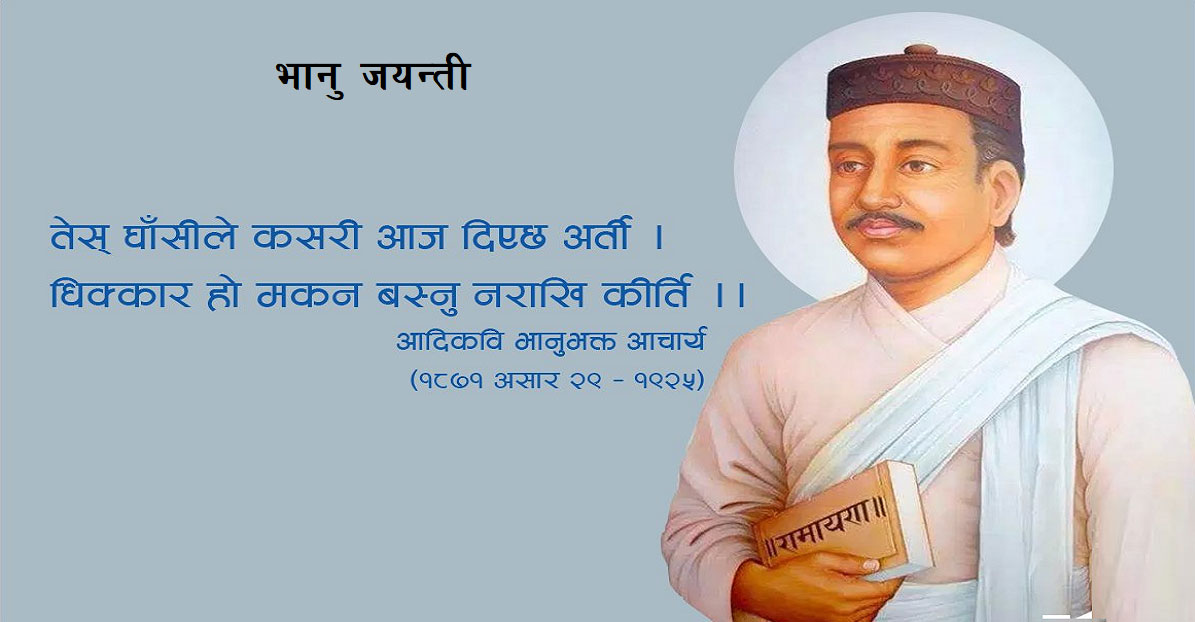
Celebrating Bhanu Day (Bhanu Jayanti) on Asar 29
Asar 29 marks Bhanu Day, also known as Bhanu Jayanti, a significant day dedicated to the remembrance of Adikavi Bhanubhakta. This year is particularly notable as it celebrates his bicentenary, leading to increased recognition and discussions about his contributions.
Bhanubhakta's Contribution to Nepali Language and Literature
- Unparalleled Contributions: Bhanubhakta played a crucial role in the upliftment and development of the Nepali language and literature. He is revered as the Adikavi (pioneering poet) of Nepali for his monumental contributions.
- Popularizing Nepali Language: Before Bhanubhakta, the Nepali language existed but was not widely spoken among common people. His translation of the Ramayana into Nepali, which was simple and easy to understand, helped make the language popular among the masses.
Impact of Bhanubhakta's Work
- Cultural Unification: While Prithvi Narayan Shah unified Nepal politically, Bhanubhakta unified the country culturally through language. His work helped bind the newly formed nation together.
- Inspirational Stories: Bhanubhakta’s motivation to serve society was inspired by a grass cutter’s philanthropic act of digging a well, demonstrating his deep sense of social responsibility.
Recognition by Motiram Bhatta
- Publishing Works: Bhanubhakta’s works were brought to a broader audience by the young poet Motiram Bhatta, who took them to Banaras for publication. This act significantly boosted the reach and impact of Bhanubhakta's writings.
Importance of Remembering Bhanubhakta
- Legacy: It is crucial to remember and honor Bhanubhakta’s contributions to ensure that future generations also recognize and respect his work.
- Genealogy and Ancestry: Tracing Bhanubhakta’s ancestry reveals a rich historical background, linking him to notable families and significant historical events.
Birth Date and Historical Clarifications
- Birth Date Confusion: Various historical records and researchers have debated Bhanubhakta’s exact birth date. Initial records mention Asar Krishna Ashtami of 1871, but further studies suggest there might be inaccuracies in the early documentation.
- Astrological Studies: Further astrological studies and examination of old documents are required to clarify these discrepancies.
Early Works and Legal Education
- Early Writings: Contrary to some beliefs, Bhanubhakta’s first poems were not ‘Ghansi’ and ‘Balkanda’ but earlier lyrical works.
- Legal Education: Bhanubhakta’s legal education and stay in Palpa, demonstrated through various legal documents, show his deep understanding of legal matters and administration.
Life and Legacy
- Later Years: Bhanubhakta’s later years involved significant legal and administrative work, which did not leave him much time for poetry.
- Final Works: His final works and the circumstances of his deathbed writings provide a rich area for further research and understanding of his life’s impact.
Conclusion
Bhanubhakta’s contributions to Nepali language and literature are immense and irreplaceable. Celebrating Bhanu Day on Asar 29 not only honors his legacy but also serves as a reminder of the cultural and linguistic unity he helped foster in Nepal. As we remember Adikavi Bhanubhakta, it is essential to continue promoting his work and ensuring that his legacy is preserved for future generations.
Important Dates in Bhanubhakta's Lifetime
|





